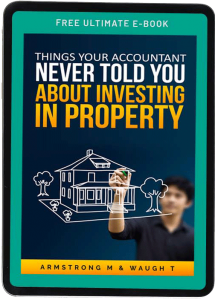5 Questions to Ask When Choosing an Investment Property Accountant
Choosing a property tax specialist to assist with your wealth journey can seem like a daunting task.
How do you really know whether the accountant does specialise in property and the myriad of tax issues ?
We have put together 7 questions to ask an adviser before you decide whether the adviser is right for you.
1. How much experience do you have?
Make sure to ask potential tax accountants how much experience they have working with investment properties and property development structures.
Ideally, you want someone with a minimum of five years in the industry to make sure you are getting comprehensive, accurate advice on minimising your taxes and structuring your portfolio for optimal results.
Ask for references and do some research to make sure you’re working with the best professional for you.
Ask the adviser if they have published any material on property tax accounting.
We have published a book called “Things Your Accountant Never Told You About Investing in Property”
You can download a free copy here
Book – Property Tax Specialists

2. What type of things do you specialise in ?
An experienced investment property tax accountant should have a good understanding of the distinct types of investment properties and property developments.
Ask the potential accountant what experience they have had in dealing with clients who have
1. subdivided a main residence and sold a vacant block of land. Ask them about whether the main residence exemption applies to the vacant block of land. And will GST apply to the sale of the vacant block.
2. held a property for a long period of time and then decided to undertake a duplex development on the property. Ask the property tax accountant whether this sale is on capital account or on revenue account ?
The property tax specialist should be able to clearly explain in this example
a) the difference between something being on capital account, a profit from an isolated transaction and the trading stock provisions and how they interact with each other.
b) how GST may apply this activity and strategies for minimising the potential GST on sale.
3. What experience have they had with Property Developers ?

Are you a property developer looking for tax, accounting, finance and loan advice ?
Property Developers understand the complexity of the tax law and how structuring their property development can save tens of thousands of dollars in tax.
Does the firm of property accountants have experience with clients in
- Structuring the Development
- Asset Protection
- GST and Margin Scheme
- Feasibility Studies
- Loans and Private Lenders
- Joint Ventures
4. What experience have they had with successful Private Binding Ruling Applications.

Investment Property Tax Accountants understand that the tax law is incredibly complex and what may apply to one client situation doesn’t necessarily apply for another.
As an example, we successfully applied for a Private Binding Ruling for a client where they were told that GST would apply on the sale of their subdivided property.
Based on some of the unique aspects of this matter we were able to argue that the sale was not subject to GST saving the client tens of thousands of dollars in indirect taxes.
You should be asking the property accountant how many Private Binding Rulings they have applied for and how successful they have been in those applications.
Property accountants will have been exposed to many issues that sometimes need to be argued with a private binding ruling. These can include
1. capital gains tax
2. tax deductions
3. land tax advice (although as this is a State based tax we use specialist legal advisers in this area)
4. property matters in general
It is imperative to receive the right advice and for your property tax specialist to be guiding you in the right direction.
5. Do You Outsource Your Work or Allocate me to Junior Team Members ?
Before you engage with any professional you shouldn’t be afraid to ask some tough questions as you are looking to build a long term relationship.
As Australia is experiencing a shortage of accountants many firms are outsourcing your work to the Philippines and India.
Although there is nothing wrong with this arrangement provided it is done in compliance with the standards set out by the Tax Practitioners Board and the Professional Bodies it will be unlikely that those accountants will have the depth of experience in dealing with property investors and property developers.
Michael Armstrong deals with his clients and is involved in the preparation of their matters. He holds a Masters of Tax and has published a 170 + page book for property investors and property developers.
It is this breadth of experience and attention to detail for which clients seek him out.
Michael has been dealing with property investments for over 10 years and is a group of a small number of property tax specialists dealing with Australian rental properties and property accounting matters.
If you have a property portfolio there is no harm giving Michael a call to discuss how he might be able to help.


